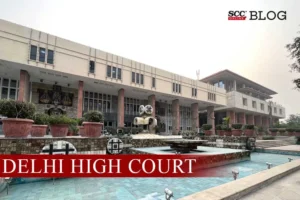Delhi High Court: A suit was filed by Japan Patent Office (plaintiff) seeking an injunction against the defendants in a rather piquant situation where the plaintiff’s ‘JPO’ logo has been allegedly appropriated by the defendants who are using an identical logo for manufacture and sale of tools and kits. Prathiba M Singh, J., restrained the defendants and all others acting for or on their behalf from using the impugned JPO mark, JPO logo, as well as the impugned word mark ‘JPO PLATINUM’, or any other mark identical or like the JPO mark and logo, in respect of any products or services with immediate effect.
The JPO is a Japanese governmental agency that oversees the Industrial Property Rights affairs in Japan and functions under the Ministry of Economy, Trade and Industry, Japan, located in Kasumigaseki, Chiyoda, Tokyo. JPO has been associated with the founding date of Patent Law in Japan, on 18-04-1885, when the Patent Monopoly Act of Japan was enacted, celebrated as the Invention Day in Japan to raise public awareness of the industrial property rights system including the patent system. JPO is one of the five largest five patent offices in the world along with the European Patent Office (EPO), Korean Intellectual Property Office (KIPO), China National Intellectual Property Administration (CNIPA), and the United States Patent and Trademark Office (USPTO). Japan was the first country with which India established a Patent Prosecution Highway in 2019, thus having goodwill even within India for the last several years. The JPO’s logo is stated to have been adopted in 2011 to commemorate the 125th anniversary of the Industrial Property Rights System in Japan.
The plaintiff provides services to intellectual property owners for the registration of patent utility models, designs and trademarks. It is headed by a commissioner. The JPO has had many collaborations internationally in various organizations including World Intellectual Property Organization (WIPO) and Asia Pacific Industrial Property (AIPC), etc. In India, the JPO has a history of holding training programs and seminars in the field of Intellectual Property since 1996. In 2006, an MoU was entered into between JPO and Controller General of Patents, Designs and Trademarks, India (CGPDTM) for cooperation in Intellectual Property. The Memorandum of Cooperation on Industrial Property, 2015 recognizes the cooperation between JPO and CGPDTM for the speedy processing and disposal of IP applications while ensuring the quality of Intellectual Property Rights.
Defendant 1 i.e. A2Z Glass and Glazing Co. is a proprietorship firm owned and managed by one Mr. Ramesh Sharma. As per the plaint, Defendant is engaged in the business of manufacturing and supplying glass connectors and glass door handles. The company is also engaged in the trading business of architectural glass fittings, shower handles, shower hinges, etc. of third-party companies under their respective brand names. Defendant 2 and Defendant 3 are sister concerns of Defendant 1. The case of the plaintiff is that the defendants have blatantly copied Plaintiff’s ‘JPO’ mark/logo, for manufacturing and selling of their products in India. Defendants have also filed for trademark registration of their mark ‘JPO PLATINUM’ which is opposed by the Plaintiff.
The Court noted that the use of an identical colour combination and an identical logo by the defendants leaves no manner of doubt that the same is a complete imitation and copy of the JPO’s logo. The Defendants can have no explanation whatsoever for adopting this logo. The logo is an original artistic work and is entitled to copyright protection, as since the date of its creation, Japan has been a WTO country. Under Section 14 of the Copyright Act, 1957, JPO would have the exclusive rights to use this logo. The JPO does not have a registered trademark or copyright in its favour. It is but natural that the JPO could have never imagined that its logo would have been imitated by anyone. Thus, the non-filing of any trademark application for registration by the JPO is fully explicable.
The Court concluded that this is a case where the Intellectual Property Office of Japan has found itself at the receiving end of infringement and imitation by unscrupulous Defendants. The defendants’ use of the identical mark and logo would be violative of the Plaintiff’s goodwill and brand equity. Such misuse would cause dilution to the Plaintiff’s logo and mark. In any event, the same would also be an infringement of the copyright in the plaintiff’s logo. Thus, in cases relating to trademark violations and passing off, if the evidence establishes a prima facie case, even at the ex-parte stage, an injunction ought to be granted.
Thus, the Court held that the plaintiff makes a prima facie case for grant of an ex parte injunction. The balance of convenience also lies in favour of the plaintiff considering that it is a well-reputed patent office in the world, which grants and protects the rights of other Intellectual Property Right owners. If an injunction is not granted in the present case, it will lead to irreparable loss/harm to the Plaintiff’s reputation and goodwill as also lead to dilution of its brand equity. This is a fit case for granting an ex parte injunction.
[Japan Patent Office v A2Z Glass and Glazing Co., 2023 SCC OnLine Del 6414, decided on 11-10-2023]
Advocates who appeared in this case :
Mr. Pravin Anand, Mr. Dhruv Anand, Ms. Udita M. Patro, Ms. Sampurnaa Sanyal & Ms. Nimrat Singh, Advocates for plaintiff

